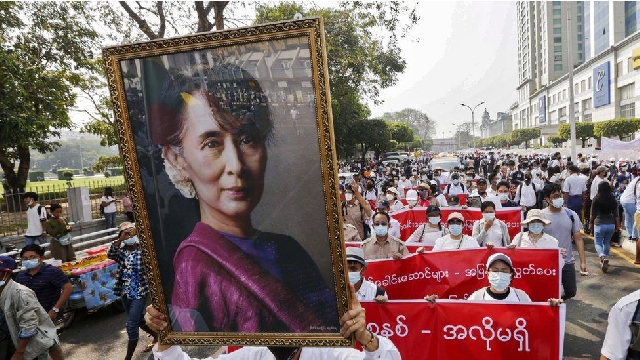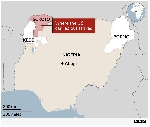Myanmar coup: Aung San Suu Kyi appears in court to face fresh charges
 Myanmar's Aung San Suu Kyi appears in court to face fresh charges
Myanmar's Aung San Suu Kyi appears in court to face fresh charges
Myanmar's Aung San Suu Kyi has been seen by her lawyers for the first time since she was detained during a military coup a month ago.
Ms Suu Kyi, who appeared in court via video link, appeared to be in "good health" and asked to see her legal team, her lawyers said.
She has been held in an undisclosed location since the coup on 1 February.
Protesters took to the streets again on Monday, despite Sunday seeing the deadliest day yet with 18 killed.
The deaths came as the military and police ramped up its response to demonstrations across the South East Asian nation over the weekend, firing into the crowds.
However, protesters were once again out in force on Monday, demanding the elected government be restored and Ms Suu Kyi and other leaders of her party, the National League for Democracy (NLD), be released from detention.
The military says it seized power because of alleged fraud in November's general elections, which saw the NLD win by a landslide.
It has provided no proof of these allegations although it has replaced the Election Commission and promised fresh polls in a year.
Where has Ms Suu Kyi been?Ms Suu Kyi was placed under house arrest when the coup began on 1 February and had not been seen in public until today's hearing, when she appeared via video link at the court in the capital, Nay Pyi Taw.
Ms Suu Kyi originally faced two charges of illegally importing walkie talkies and violating Myanmar's natural disaster law, but further charges were added on Monday, including breaching Covid-19 restrictions during the election campaign and for causing "fear and alarm".
The initial charges carried sentences of up to three years in jail. It is not clear what punishment the new charges might carry. The case has been adjourned until 15 March.
Myanmar Now reported on Monday that ousted president Win Myint - a key ally of Ms Suu Kyi - has also been charged for incitement under the penal code.
Myanmar's Aung San Suu Kyi has been seen by her lawyers for the first time since she was detained during a military coup a month ago.
Ms Suu Kyi, who appeared in court via video link, appeared to be in "good health" and asked to see her legal team, her lawyers said.
She has been held in an undisclosed location since the coup on 1 February.
Protesters took to the streets again on Monday, despite Sunday seeing the deadliest day yet with 18 killed.
The deaths came as the military and police ramped up its response to demonstrations across the South East Asian nation over the weekend, firing into the crowds.
However, protesters were once again out in force on Monday, demanding the elected government be restored and Ms Suu Kyi and other leaders of her party, the National League for Democracy (NLD), be released from detention.
The military says it seized power because of alleged fraud in November's general elections, which saw the NLD win by a landslide.
It has provided no proof of these allegations although it has replaced the Election Commission and promised fresh polls in a year.
Where has Ms Suu Kyi been?Ms Suu Kyi was placed under house arrest when the coup began on 1 February and had not been seen in public until today's hearing, when she appeared via video link at the court in the capital, Nay Pyi Taw.
Ms Suu Kyi originally faced two charges of illegally importing walkie talkies and violating Myanmar's natural disaster law, but further charges were added on Monday, including breaching Covid-19 restrictions during the election campaign and for causing "fear and alarm".
The initial charges carried sentences of up to three years in jail. It is not clear what punishment the new charges might carry. The case has been adjourned until 15 March.
Myanmar Now reported on Monday that ousted president Win Myint - a key ally of Ms Suu Kyi - has also been charged for incitement under the penal code.
What's the context to all this?Myanmar's military seized power on 1 February, declaring a state of emergency and handing all power over to General Min Aung Hlaing.
Just days later, the civil disobedience movement began to emerge - professionals who are refusing to return to work in protest.
The movement quickly started to gain momentum and it wasn't long before hundreds of thousands of people began taking part in street protests.
Protests in recent days have seen an escalation of violence between police officers and civilians - with at least 18 people killed in a protest over the weekend.
Source: BBC
Trending World

Bulgaria joins the euro after rocky path to new currency
00:16
Iran protesters try to break into government building as unrest continues
00:13
Mali and Burkina Faso impose travel ban on US citizens in tit-for-tat move
00:08
Bangladesh's first female prime minister Khaleda Zia dies aged 80
22:38
Thieves use drill to steal €30m in German bank heist
22:35
Guinea junta chief takes lead in controversial election as social media restricted
22:30
Living in fear of Lakurawa - the militant group Trump targeted in Nigeria strikes
19:31
US pledges $2bn for humanitarian aid, but tells UN 'adapt or die'
19:21
9 arrested in Italy for allegedly raising millions for Hamas
00:08
Israel recognises Somaliland as independent state, Netanyahu says
01:42



